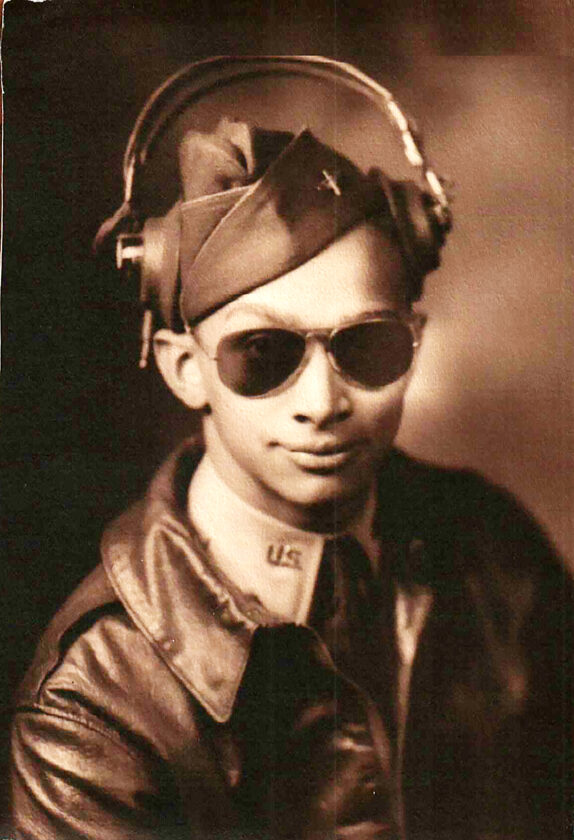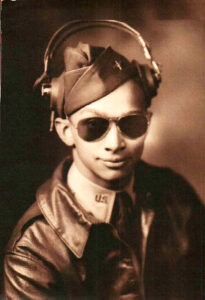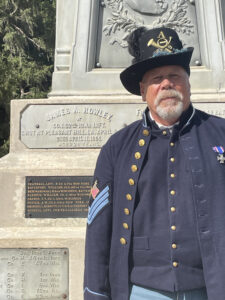Maurice Esters — U.S. Army Air Force
Webster City resident flew with Tuskegee Airmen
- Maurice V. Esters

Maurice V. Esters
WEBSTER CITY — When it came time to serve his country during World War II, Maurice V. Esters looked to the sky.
The late Webster City man enlisted in the Army Air Force and became one of the Tuskegee Airmen, America’s first black fighter pilots. He was one of 12 Iowans to be part of that legendary group.
He flew combat missions around the Mediterranean Sea until the engine of his P-47 Thunderbolt conked out in flight one day in June 1944. After bailing out of the crippled plane, he floated in a raft in the Adriatic Sea for awhile. But when rescuers arrived, Esters was nowhere to be seen. He was listed as missing in action and was later declared dead.
Today, his deeds are recorded in a comprehensive archive of World War II veterans maintained at the Kendall Young Library in Webster City. And fellow Tuskegee Airman, Luther Smith, of Villanova, Pennsyslvania, told The Messenger in 2002 that he still remembered the pilot he described as “rather quiet and unassuming.”
“He was a very fine person, fine character,” said Smith, who died in 2009. “His character couldn’t be better.”
Esters, nicknamed “Smokey” was the son of Charles H. Esters Sr., of Webster City. His mother’s name isn’t listed in the library archive. Before joining the military, the younger Esters worked as a bellman at the Hotel Willson, which stood at the corner of Second and Des Moines streets for more than a century.
He enlisted in the military on Aug. 10, 1942, and was sent to the Tuskegee Army Flying School at Tuskegee, Alabama. Smith, who was originally from Des Moines, was in Esters’ cadet class there.
In a letter published in a Webster City newspaper, Esters described his first solo flight in late 1942.
“I must admit that that front cockpit looked awfully empty on that trip,” he wrote, recalling his first flight without an instructor pilot aboard.
Esters graduated from the flight school on May 28, 1943, and was commissioned as a second lieutenant. He was stationed at Selfridge Field in Michigan before being sent overseas.
He went to Italy in January 1944 and was assigned to the 301st Fighter Squadron, based in Naples, and later, Ramitelli. He and his fellow pilots provided air cover for allied ships traveling through the Mediterranean Sea. They also patrolled coastal regions in search of enemy lanes and ships.
In May 1944, Esters was promoted to first lieutenant.
The engine failure that led to Esters’s disappearance happened on June 26, 1944. Smith, who was also based in Italy at the time, said Esters parachuted out of his plane and landed in the Adriatic Sea. He inflated a life raft and was safely aboard it, Smith added.
“He waved to the pilot who was circling above him,” Smith said.
An air-sea rescue team was dispatched to pick up Esters. But the team never found him. No one knows what happened to him and his body was never recovered.
“It was a mystery as to what must have happened,” Smith said.
He added that shortly before the war ended he heard a rumor that Esters made it to shore in Yugoslavia and was confronted by hostile forces.
The Army Air Force declared Esters missing in action. In February 1945, while still listed as missing in action, Esters was awarded the Air Medal for “exceptionally meritorious achievement in action against the enemy.”
In August 1945, the military declared Esters dead. That month, Esters’s father received a letter from Lt. Gen. Ira C. Eaker, the deputy commander of the Army Air Force, in which the general praised the pilot. Part of that letter was published in a Webster City newspaper.
“It has been called to my attention that Lt. Esters’ aptitude and enthusiasm for military aviation was reflected in the fine record he maintained during his cadetship which he concluded by graduation at Tuskegee Army Flying School,” Eakers wrote. “Throughout his career as an officer and pilot in the Army Air Force he earned the approbation of superiors for his cooperative manner and cheerful performance of duty.”
“In his passing the service has lost a most worthy airman,” Eaker concluded.




